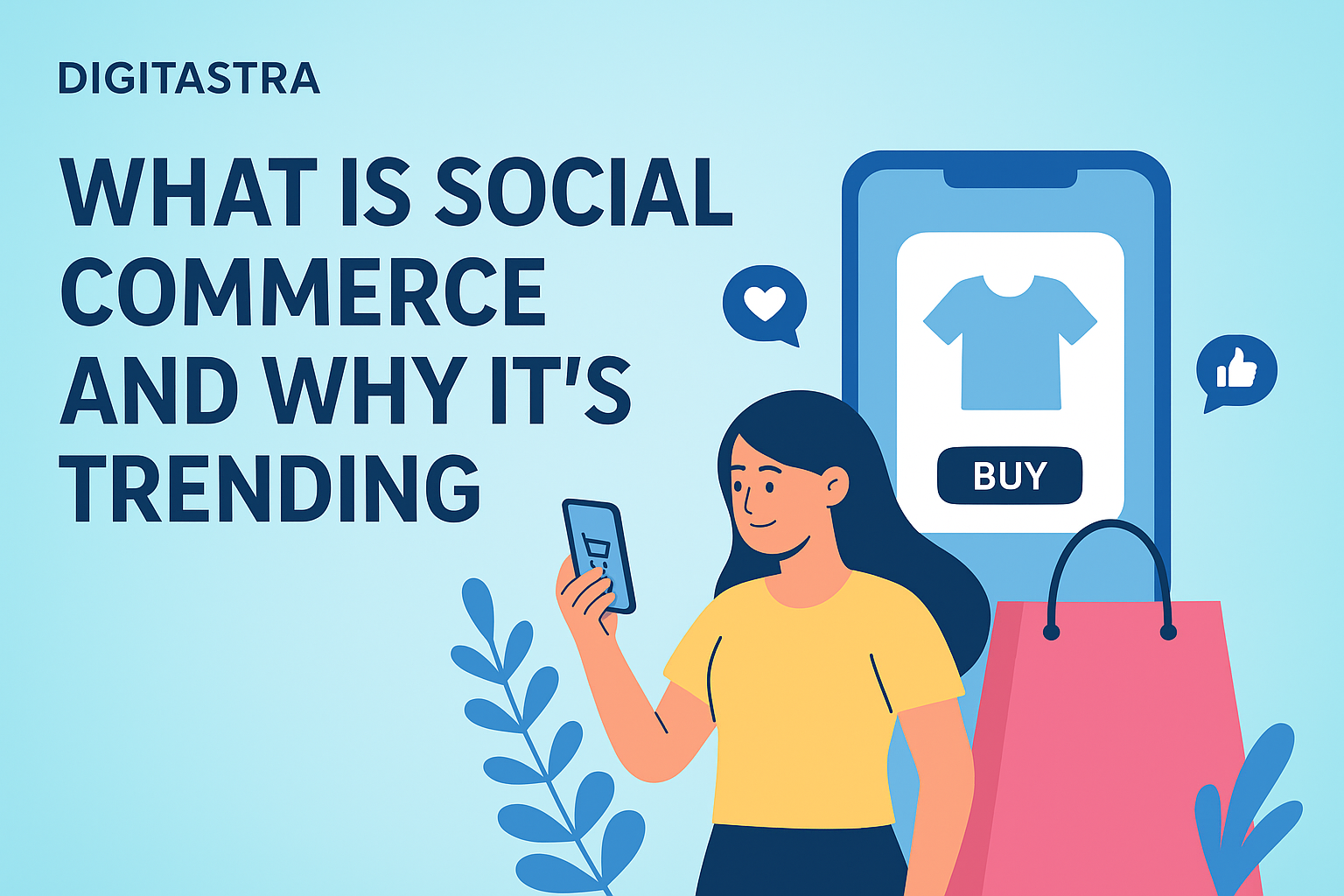
In recent years, social commerce in India has exploded, transforming the way consumers discover and purchase products online. Unlike traditional e-commerce, which happens mainly on websites or apps, social commerce allows people to shop directly through platforms like Instagram, Facebook, and WhatsApp.
For startups, small businesses, and D2C brands, social commerce has become a game-changer. With over 467 million active social media users in India (2024), brands can now connect with audiences where they spend most of their time on social platforms. In this article, we’ll explore what social commerce is, why it’s trending, and how your business can leverage it effectively.
What Is Social Commerce?
Social commerce is the integration of online shopping experiences within social media platforms. Instead of redirecting users to a website, platforms like Instagram Shops or Facebook Marketplace allow customers to browse, engage, and buy products without leaving the app.
This makes the shopping journey seamless, combining social engagement, influencer marketing, and e-commerce convenience into one.
Why Social Commerce Is Trending in India
1. The Rise of Social Media Usage
India ranks among the top countries in social media consumption. With 80% of internet users engaging with at least one brand online, social platforms have become natural shopping hubs.
2. Growth of D2C Brands
From skincare startups to fashion labels, D2C brands in India are using social commerce to bypass traditional retail and directly connect with customers. Platforms like Instagram Reels and WhatsApp Business make it easy to showcase products and drive sales.
3. Influencer-Driven Economy
According to Influencer Marketing Hub, 63% of consumers trust influencer recommendations more than traditional ads. Social commerce leverages this trust by combining influencer content with shoppable posts.
4. Seamless Checkout Experiences
Instagram Checkout and WhatsApp Payments allow users to complete purchases without switching apps. This reduces friction and boosts conversions.
5. Affordable Access for Small Businesses
Unlike large-scale e-commerce platforms, social commerce gives small businesses a low-cost entry point to start selling online.
Benefits of Social Commerce for Indian Businesses
- Increased Engagement – Customers can like, share, and comment on products, making shopping interactive.
- Higher Conversion Rates – With fewer steps, buyers are more likely to complete purchases.
- Personalized Marketing – Social platforms use AI to recommend products, helping brands reach the right audience.
- Trust-Building – Social proof in the form of reviews, UGC (user-generated content), and influencer endorsements builds credibility.
Actionable Steps to Leverage Social Commerce
- Set Up Shop Features – Use Instagram Shops, Facebook Marketplace, and WhatsApp Business catalogs.
- Invest in Visual Storytelling – High-quality product photos, videos, and reels increase engagement.
- Collaborate with Micro-Influencers – They deliver authentic endorsements at lower costs than celebrities.
- Use Shoppable Content – Tag products directly in posts and stories for instant purchases.
- Leverage Chatbots – Automate queries and guide customers to checkout faster.
- Run Targeted Ads – Use Facebook and Instagram ads to promote products directly within shopping tabs.
Examples of Social Commerce in India
- Meesho – Empowering resellers and small businesses with social-driven sales.
- Myntra’s Social Commerce Features – Myntra Studio allows influencers to create content linked to products.
- Nykaa on Instagram – Product tags, influencer collabs, and live shopping events drive strong conversions.
These examples prove that social commerce is no longer optional—it’s essential for growth in 2025.
Internal Linking Suggestion
To maximize results, businesses should integrate social commerce with SEO, branding, and website design. A seamless digital presence ensures that social traffic converts into loyal customers. Learn more about Digitastra’s social media and digital marketing services.
FAQs on Social Commerce
Q1: What is the difference between e-commerce and social commerce?
E-commerce happens on dedicated websites or apps, while social commerce enables shopping directly within social platforms like Instagram or Facebook.
Q2: Is social commerce relevant for small businesses in India?
Yes. Social commerce allows even small businesses to showcase products affordably, reach targeted audiences, and build trust through social proof.
Q3: Which social media platforms support social commerce in India?
Instagram, Facebook, WhatsApp, and YouTube are leading platforms enabling social shopping experiences.
Q4: How can D2C brands use social commerce effectively?
They can create shoppable posts, partner with influencers, run live shopping events, and leverage WhatsApp catalogs for direct orders.
Q5: Does social commerce really increase sales?
Yes. With fewer checkout steps and higher engagement, social commerce has been shown to improve conversion rates significantly.
Social commerce is reshaping the future of online retail in India. By blending social media engagement with seamless shopping, it empowers startups, small businesses, and D2C brands to grow faster and connect more authentically with customers.
At DIGITASTRA, we help businesses tap into the power of social commerce through branding, SEO, website design, and social media marketing. If you want your brand to stay ahead in the new era of digital shopping, the time to act is now.


